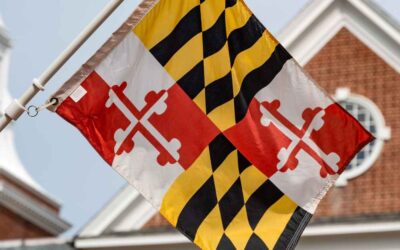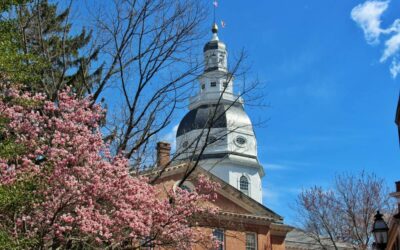Just a little more than a year after our country shut down in the face of a national pandemic, the Maryland legislature successfully completed their 2021 Legislative Session after shutting down 3½ weeks early in 2020. Three months of Zoom hearings and testifying while masked on the House and Senate floors, with very little of the social interactions that usually accompany a busy session, has left legislators and lobbyists alike exhausted and longing for business-as-usual.
Despite the complications posed by a virtual session, the Maryland legislature accomplished a few important initiatives, not the least of which is the passage of a $52.4 billion budget to provide recovery to those who have been adversely financially impacted by the global pandemic. The budget, which takes effect July 1, 2021, provides financial assistance to the most vulnerable Marylanders, expands education funding to get children back to school and address pandemic-related learning losses, and replenishes the state’s rainy-day fund. In addition to the state’s annual budget, Governor Hogan and lawmakers added an additional $1.5 billion in federal stimulus money to further fuel the state’s economic recovery. Included in the supplemental plan is $100 million dollars slated to compensate government essential workers for hazard pay dating back to September 2020; approximately $600 million is provided for the reopening of all schools by Fall 2021 including $80 million to improve the schools’ air filtration systems to provide for a safer environment for students; and $100 million for county workforce initiatives to retrain and place individuals who have lost their jobs due to COVID-19.
Sports Betting
The Maryland General Assembly also spent time tackling the regulatory framework that will allow for sports betting to take place in the state. Marylanders voted last November to allow for sports betting and left it to the legislature to iron out the details. The agreement that passed allows for in-person betting licenses for existing casinos, an additional 30 bricks-and-mortar licenses, and 60 online betting licenses; takes great strides towards encouraging equity ownership in sports betting licenses; and will allow the state to collect roughly 15% of the revenue generated by these licenses to pay for public education. The state is expected to take in about $20 million per year in such taxes. Those wishing to cast their bets on sporting events will be able to do so at the state’s existing casinos, horse tracks, stadiums and on sports betting apps.
Police Reform
On the heels of mass protests against police brutality and racism last summer, legislative leaders vowed to address wide ranging changes in policing statutes. At issue were body cameras, recruitment and training of police officers, and disciplinary measures in use-of-force incidents. The bill removes the Law Enforcement Bill of Rights that has protected police officers accused of wrongdoing since the 1970s; increases the maximum amount of settlements in lawsuits against police departments; and makes it possible for police to lose their pensions for committing certain kinds of crimes. Debate between chambers was emotional and negotiations on this issue were underway until the waning days of session, but passed in time for the Governor to veto and the legislature to override the vetoes. The majority of these reforms will go into effect on June 1, 2021.
Telehealth
Another important issue that arose out of necessity following the global pandemic and subsequent stay-at-home order was the need to create a statutory structure around telehealth services. While the federal government passed emergency directives that allowed for many medical services to be delivered via audio or audio-visual means, those allowances are slated to resolve once the current crisis has ended. Consumers and providers both have realized the benefits of being able to give and receive medical services, especially behavioral health services, through a myriad of modems. The Maryland legislature was able to strike a balance between allowing for multiple delivery modules while ensuring that the proper framework for maintaining quality healthcare services remains in place.
Essential Workers
In recognition of the sacrifices of individuals who were deemed to be essential workers during the global health crisis and were unable to perform their duties remotely, the general assembly passed legislation that would provide additional paid sick leave, the right-to-refuse to enter an unsafe workplace, and coverage for medical expenses arising out of healthcare emergencies for the current pandemic prospectively and all future catastrophic health emergencies. After many hours of heated discussions to try and balance the needs of future essential workers and the businesses who employ them, the legislature was finally able to create a rough framework to provide a less fragmented state-wide approach to any future health emergency.
The Maryland General Assembly’s first post-pandemic legislative session was unprecedented in many ways from virtual hearings and voting sessions, daily COVID testing, and the remote location of staff, to mandatory face masks and hockey-like penalty boxes separating the members in the chambers. However, the legislature’s willingness to conquer these difficulties head-on was widely evident in the important work that was accomplished in spite of the conditions. While some changes that were made may become permanent, a return to normalcy in our state government will be welcome.




